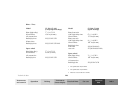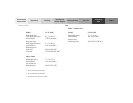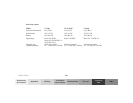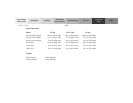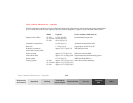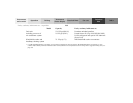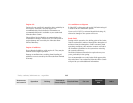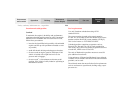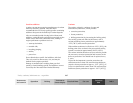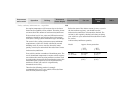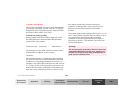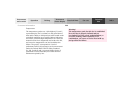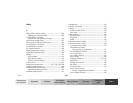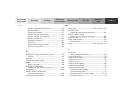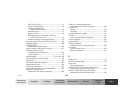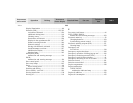
397Fuels, coolants, lubricants etc. - capacities
Technical
data
Instruments
and controls
Operation Driving
Instrument
cluster display
Practical hints Car care Index
Gasoline additives
A major concern among engine manufacturers is carbon
build up caused by gasoline. Mercedes-Benz
recommends the use of only quality gasoline containing
additives that prevent the build up of carbon deposits.
After an extended period of using fuels without such
additives, carbon deposits can build up especially on the
intake valves and in the combustion area, leading to
engine performance problems such as:
• warm-up hesitation,
• unstable idle,
• knocking/pinging,
• misfire,
• power loss.
Do not blend other specific fuel additives with fuel.
They only result in unnecessary cost, and may be
harmful to the engine operation.
Damage or malfunctions resulting from poor fuel
quality or from blending specific fuel additives are not
covered by the Mercedes-Benz Limited Warranty.
Coolants
The engine coolant is a mixture of water and
anticorrosion/antifreeze, which provides:
• corrosion protection,
• freeze protection,
• boiling protection (by increasing the boiling point).
The cooling system was filled at the factory with a
coolant providing freeze protection to approximately
-22°F (-30°C) and corrosion protection.
If the antifreeze mixture is effective to -22°F (-30°C), the
boiling point of the coolant in the pressurized cooling
system is reached at approximately 266°F (130°C).
The coolant solution must be used year round to provide
the necessary corrosion protection and increase in the
boil-over protection. You should have it replaced every
3years.
To provide the important corrosion protection, the
solution must be at least 45% anticorrosion/antifreeze
(equals a freeze protection to approx. - 22°F [-30°C]). If
you use a solution that is more than 55% anticorrosion/
antifreeze (freeze protection to approx. - 49°F [-45°C]),



